The White House released President Trump’s infrastructure plan today, which calls for spending $200 billion federal dollars as seed money to stimulate a total of $1.5 trillion on “gleaming new infrastructure.” Almost lost in the dozens of pages of documents issued by the administration is that the reason why the federal government supposedly needs a new infrastructure program is that our infrastructure is crumbling, and the reason it is crumbling is that politicians would rather spend money on gleaming new projects than on maintaining the old ones.
The White House proposes several new funding programs. The administration could have dedicated one or more of these programs to maintenance and repair of worn-out infrastructure. Instead, all $200 billion can be spent on new projects, and knowing politicians, most of it will be. To make matters worse, funds for most of the programs would be distributed in the form of competitive grants, but experience has proven that competitive grants are highly politicized.
“In the past, the Federal Government politically allocated funds for projects, leading to waste, mismanagement, and misplaced priorities,” agrees White House economic advisor Gary Cohn. The administration’s solution, Cohn continues, is to “stimulate State, local, and private investment.” In other words, instead of most decisions being made by Washington politicians, they will be made by local politicians. But if local politicians were any better at maintaining infrastructure, then we wouldn’t have tens of thousands of local bridges classed as “structurally deficient” and the New York, Washington, Boston, and other subway systems wouldn’t be falling apart. Continue reading








